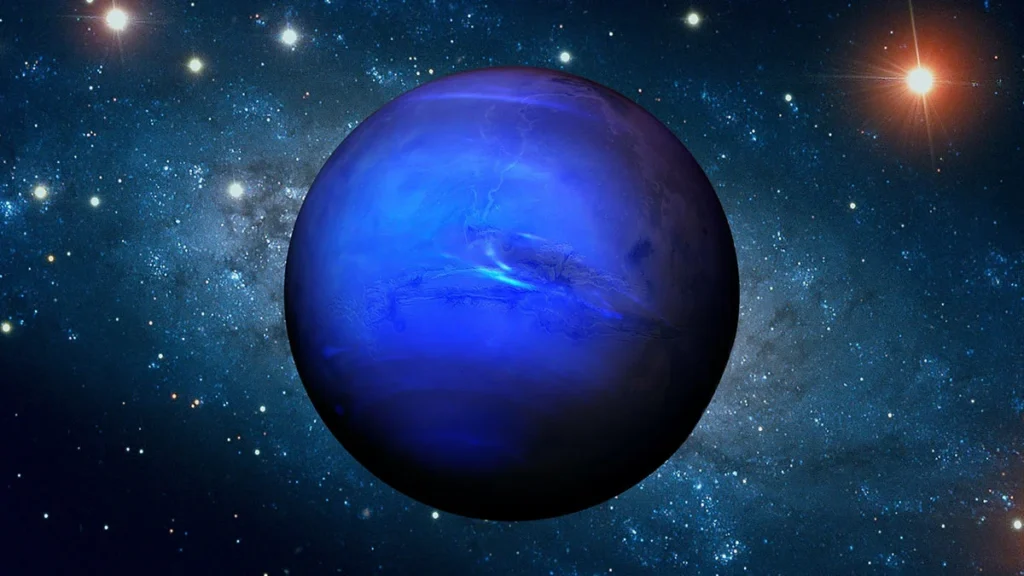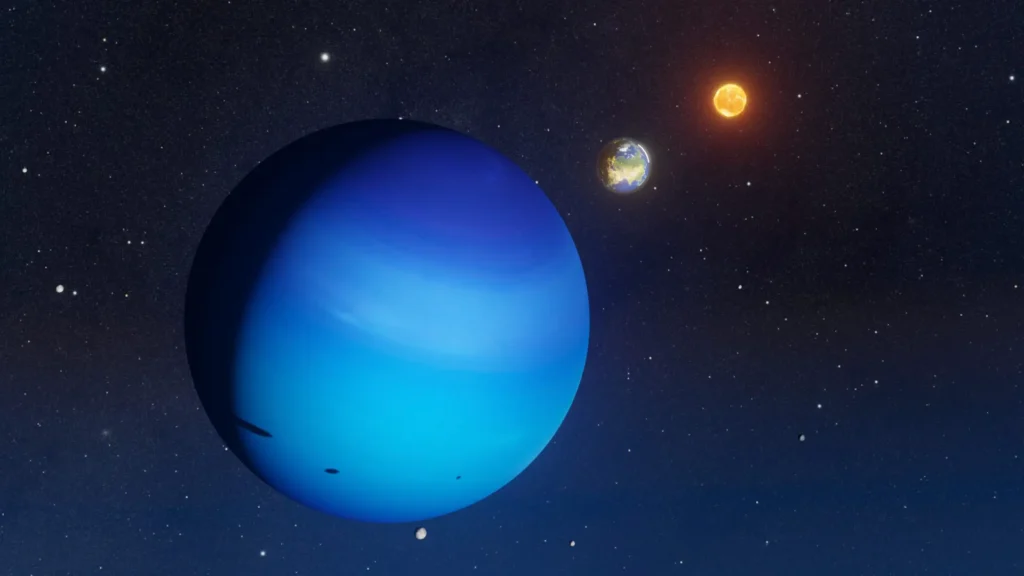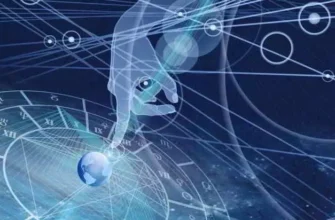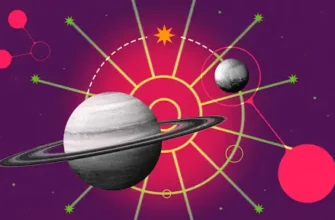Neptune is a slow-moving, deeply mysterious, and feminine planet that travels through a single constellation roughly every fourteen years. Among the outer planets — Uranus, Neptune, and Pluto — it is considered the most potent in shaping the collective psyche of entire generations. In astrology, Neptune rules the unseen realms of dreams, imagination, and spiritual longing. It represents the world beyond the senses — a dimension where inspiration, creativity, mysticism, and illusion intertwine.
Neptune governs everything intangible: visions, ideals, intuition, empathy, and fantasy. It is both the planet of divine inspiration and the planet of deception, capable of dissolving boundaries between reality and illusion. Its influence is subtle yet pervasive, often creating confusion, idealization, or escapism. Where Neptune reigns, clarity fades — but in that mist, profound creativity and spiritual awakening can arise.
Discovered in 1846, Neptune orbits the Sun once every 165 years, spending approximately 14 years in each zodiac sign. This slow journey makes its energy generational rather than personal, shaping the dreams, philosophies, and artistic sensibilities of entire eras. The sign where Neptune is placed reveals the collective spiritual tendencies of that generation, while the house it occupies in an individual chart shows where one seeks transcendence, idealism, and sometimes self-delusion.
Neptune is the modern ruling planet of Pisces ♓️ and is exalted in Aquarius ♒️. In Roman mythology, Neptune was the god of the sea — mysterious, powerful, and unpredictable. The planet’s deep, ocean-blue color mirrors the infinite and unfathomable waters of his domain. Its glyph, shaped like Neptune’s trident, symbolizes the soul (the crescent of spirit) penetrating matter (the cross), expressing the eternal tension between the material and spiritual worlds.
Astrologically, Neptune represents the collective unconscious, artistic sensitivity, compassion, and the pursuit of higher truths. It rules mysticism, music, dreams, and all forms of art that dissolve rational boundaries. It blurs distinctions between the possible and impossible, awakening the imagination but also inviting illusion. When Neptune’s energy is harmoniously expressed, it grants divine creativity, empathy, and a connection to universal love. When misused or misunderstood, it manifests as confusion, addiction, escapism, and self-deception.
In medicine, Neptune is connected with the thalamus, the spinal canal, and all ambiguous or psychosomatic disorders, reflecting its elusive and intangible nature. It governs the nervous system’s sensitivity, dreams, and the body’s mysterious responses to emotion and belief.
Neptune also carries an echo of Venus, being considered its higher octave. Both planets resonate with love, beauty, and creativity — but where Venus expresses personal affection, Neptune expands it into compassion for all beings. This connection links Neptune with Friday, the day traditionally ruled by Venus, symbolizing harmony, peace, and inspiration.
In modern astrology, Neptune is the ruler of the twelfth house, the domain of dreams, solitude, karma, and spiritual transcendence. It is the realm of the unseen — of intuition, imagination, and the dissolution of ego. Artists, mystics, healers, and dreamers are often touched by its influence, guided by the faint shimmer of the unseen world.
Like the ocean it represents, Neptune can soothe or drown, heal or confuse. Its lesson is surrender — learning to trust the flow of intuition without losing one’s grounding in reality. It is the voice of the soul whispering through mist, calling humanity toward compassion, creativity, and the infinite.
The Astrological Significance of Neptune
Neptune’s symbol is a large semicircle pierced by a cross. It symbolizes the essence of the human soul, which is constrained by the laws of materiality and thus hinders its self-manifestation. Only through inspiration and creativity that transcend reality can we dissolve the rigidity of materiality and gradually merge the two, realizing our transcendental dreams.

Imagination beyond reality
Neptune represents the energy of human dream creation, freeing us from the constraints of material things and entering the world of dreams, seeking inspiration for artistic creation. Neptune possesses extraordinary sensitivity, excelling at capturing sensory impressions in an instant. Through spiritual creativity, this is expressed in poetry, music, dance, literature, and painting.
- Neptune’s House: This sign is rich in imagination. Using the keen subconscious perception, one can capture the unrealistic and intangible information from the surrounding environment, thus becoming an extraordinary artist and dreamer.
The ability to beautify things
Neptune has the ability to beautify. It holds lofty ideals for people, things, and events, and uses various forms of packaging, modification, and rendering to beautify them to the utmost, creating a hazy beauty of distance, making it difficult for people to see the truth, and arousing human yearning for beauty.
- The house where Neptune falls: It has the ability to beautify and transform, like a chameleon, it can transform into any appearance according to environmental factors to meet the beautiful expectations of others or adapt to the environment.
Fragility and incompetence
Neptune can make people easily influenced and lacking in their own opinions. Once faced with a situation, they may feel lost and confused. Furthermore, Neptune can also make people vulnerable to being soft-hearted and not knowing how to refuse, or misjudging others and falling prey to deception and fraud.
- The house where Neptune falls is where everyone’s will is weak, where they are easily influenced, and even where a person is “most ineffective”.
Self-deception and self-deception
Neptune possesses the energy of hypnosis, bewitching, and penetrating, as well as the ability to simulate thoughts. People unconsciously absorb the surrounding atmosphere, plunging them into a trance-like state of consciousness. They are also adept at hypnotizing themselves or others with white lies. Neptune’s slow pace and tendency to be confused often lead people to realize things only after the event has passed.
- The house where Neptune falls: an area that easily makes people confused and bewildered, and tends to deceive themselves and even others.
Addictive needs
Neptune can make people lose the ability to restrain themselves, and make them indulge in the temptations of tobacco, alcohol, drugs, gambling, fun, fantasy, etc., weakening their body and mind and causing them to degenerate into addiction, or develop bad habits that are difficult to quit.
- The house where Neptune falls is where a person becomes addicted or wants to escape from everything, thus paralyzing themselves and escaping the pressure of reality.
Escapism and confusion
Neptune can make people constantly out of touch with reality or afraid of trouble. When faced with a situation, they refuse to confront it head-on or address the obstacles at hand. Instead, they find excuses and try to muddle through, adopting an ostrich-like, evasive mentality. Neptune can also make people easily confused and forgetful, often breaking promises.
- The house where Neptune is located is where everyone is most prone to making mistakes, errors, and getting hurt, and is also the most unreliable. This can make people unable to handle pressure, yet they also don’t want to put pressure on others. This often leads to failure to fulfill commitments, leading to disappointment in themselves and others.
The best and the worst
Neptune is a projection of dreams, symbolizing the human spirit’s pursuit of the highest level. Projecting unattainable dreams onto public figures can lead to idolatry. Those with strong Neptune traits often achieve success in the arts, religion, and theater, leveraging their energy to emotionally impact the public and satisfy their idolatry. However, Neptune’s energy is a double-edged sword. The more glamorous an idol’s outward appearance, whether they are an entertainer, sports star, artist, or politician, the more extreme their hidden side can be, manifesting a multifaceted personality.
- The house where Neptune falls: It can make a person rise from a sparrow to a phoenix overnight and become a person that everyone envy, but Neptune’s incompetence and powerlessness can also easily make people indulge and become addicted, involved in certain scandals, and fall from the clouds to the bottom of the valley.
A place of self-sacrifice
Neptune makes people too sensitive and fragile. Not only are they easily hurt themselves, but they are also afraid of hurting others. They would rather play the role of victim, willing to pity and sacrifice themselves, and even indulge in it, leading to pathological self-pity.
- The house where Neptune falls: This is the place where a person is most likely to be “bullied”, and it is also the place where we show broad “tolerance”, find excuses to forgive and understand others, and find reasons to forgive ourselves.
The spirit of redemption
Neptune plays the role of complete devotion, possessing the energy of great love to save all beings, showing selfless compassion and empathetic listening, only seeking peace and tranquility of mind.
- The house where Neptune falls is where individuals can show their charity without expecting anything in return. This can take the form of social service, religious outreach, public health care, charitable relief, spiritual healing, etc.
Surreal intuitive inspiration
Neptune fosters a sensitive disposition, enabling heightened intuition and the ability to achieve spiritual transcendence through clairvoyance. Neptune’s spiritual uplift manifests itself in personal practices such as spiritual practice and meditation. If Neptune remains at a low level, it can cause a person to lose the ability to distinguish between reality and illusion, or they may encounter spiritual intrusions.
Spiritual regrets and physical defects
Neptune can easily cause the immune defense line to collapse, making people susceptible to infection, leading to physical weakness, and even turning minor illnesses into irreparable physical defects, and in severe cases, leading to physical and mental paralysis.
- The house where Neptune falls is a place of psychological regret, often causing a sense of loss. It can also erode and paralyze individuals, leading to physical weakness, mental malaise, fatigue, dizziness, and drowsiness.
Insatiable desire
Neptune imbues individuals with a rich imagination, leading to unbridled daydreaming. However, this overly idealistic trait can lead people to invest energy and time in blind pursuits without knowing what they are seeking, or even to find satisfaction after achieving what they desire, resulting in a situation where they “can’t get what they want, and then, when they do, they don’t want it anymore.”
The collective dream of mankind
Neptune represents the collective spiritual desire of mankind and is the “big dream” of individual participation in collective consciousness.
- The sign where Neptune falls reflects the type of collective script that the individual is participating in. It represents how the common dream of a generation is manifested, in what form such desire is expressed, and what impact it has.
- The house where Neptune falls: shows the area where a person pursues his ideals.








